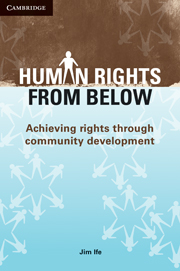Book contents
- Frontmatter
- Contents
- Acknowledgements
- Introduction
- Part 1 Thinking about community development
- Part 2 Thinking about human rights
- 3 Definitions and imperatives of human rights
- 4 Principles and dimensions of human rights
- Part 3 Bringing human rights and community development together
- Part 4 Enacting human rights from below
- Appendix: The human rights matrix
- References
- Index
3 - Definitions and imperatives of human rights
Published online by Cambridge University Press: 05 June 2012
- Frontmatter
- Contents
- Acknowledgements
- Introduction
- Part 1 Thinking about community development
- Part 2 Thinking about human rights
- 3 Definitions and imperatives of human rights
- 4 Principles and dimensions of human rights
- Part 3 Bringing human rights and community development together
- Part 4 Enacting human rights from below
- Appendix: The human rights matrix
- References
- Index
Summary
DEFINITIONS
‘HUMAN’
As with community development, attempting any clear definition of human rights is not easy. To understand why, we need to start with the two words themselves. Human and rights are both words that defy easy definition, and the definitional issues around each of them cloud any overall understanding of something called ‘human rights’. In the human rights literature there has been more concern with the problematics of the term ‘rights’ than there has been with the problematics of the term ‘human’, and this has downplayed the importance of a very contested idea.
The word ‘human’ may at first sight seem unproblematic, but it needs to be remembered that over time there have been different constructions of who, or what, counts as human (Foucault 1970, Hunt 2007, Taylor 1989). One reason the Nazis were so readily able to persecute Jews was that Jews were regarded as a somehow ‘sub-human’ species. In times of war it is common to ‘dehumanise’ (that is, see as less than fully human) the enemy, which makes it easier to hate and to kill; examples include British newspaper cartoons depicting Germans during World War I, similar portrayals of Japanese people during World War II and the language used by US soldiers in depicting the ‘enemy’ in Vietnam. In each instance the dehumanising implied that the people portrayed as ‘sub-human’ were not entitled to full ‘human rights’ and so did not need to have those rights protected.
- Type
- Chapter
- Information
- Human Rights from BelowAchieving Rights through Community Development, pp. 69 - 83Publisher: Cambridge University PressPrint publication year: 2009



